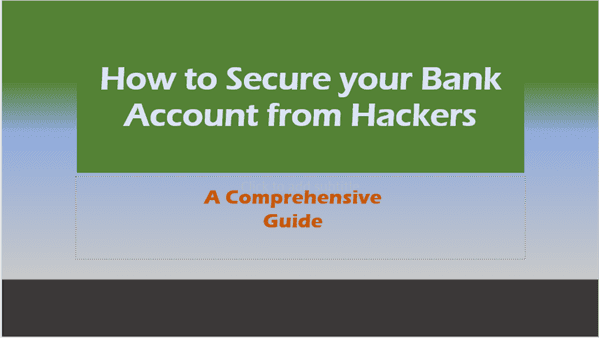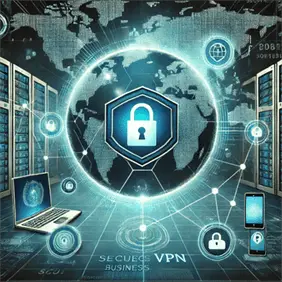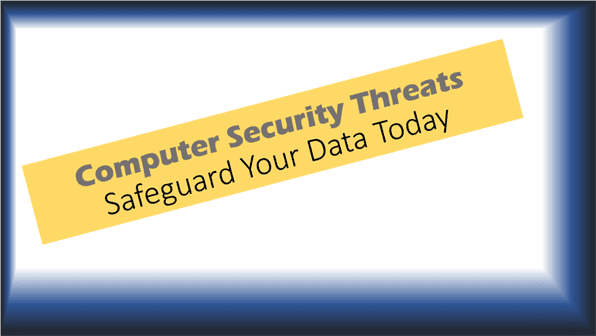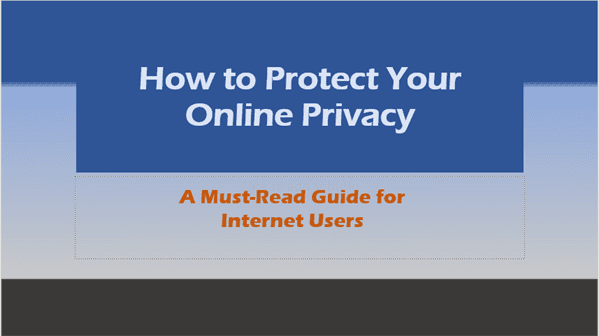How to Secure Your Bank Account from Hackers: A Comprehensive Guide
How to secure your bank account from hackers. The security of your bank account is paramount in this digital age. With the rise of online banking, the question, “How to secure your bank account from hackers?” has become a pressing concern for many internet users.
This blog post aims to provide a comprehensive guide on the steps you can take to protect your bank account from potential threats.
From understanding the tactics used by hackers to implementing robust security measures, we delve into the essential strategies for safeguarding your financial future.
Blog Post Summary:
This blog post provides a comprehensive guide on how to secure your bank account from hackers. It begins with an overview of the threats posed by hackers and the potential impact of bank account hacking.
The post then outlines several steps to secure your bank account, including creating strong and unique passwords, enabling two-factor authentication, regularly monitoring your bank account, adopting safe online banking practices, and protecting personal information.
It also provides advice on what to do if your bank account is hacked. The post concludes with a reminder of the importance of proactive measures in securing your bank account.
Introduction and Basics of Bank Account Security
Introduction
In the digital age, the question, “How to secure your bank account from hackers?” has become a pressing concern for many. With the rise of online banking, your financial life is just a click away, offering convenience but also opening doors to potential threats. The importance of securing your bank account cannot be overstated. It’s not just about protecting your hard-earned money; it’s about safeguarding your personal information, your credit score, and ultimately, your financial future.
Understanding the Threat
Hackers employ a variety of methods to access your bank account. From phishing scams that trick you into revealing sensitive information to malware that infiltrates your devices, these cybercriminals are becoming increasingly sophisticated. One might wonder, “Can someone hack my bank account with my phone number?” or “Can someone hack your bank account with your name and email?“. The answer is, unfortunately, yes. With enough information, a determined hacker can bypass security measures and gain access to your accounts.
Common methods used by hackers include:
- Phishing: Sending fake emails or texts that appear to be from your bank, asking you to confirm personal details.
- Malware: Using harmful software to infiltrate your device and steal information.
- SIM Swapping: Transferring your phone number to their device, allowing them to receive your two-factor authentication codes.
The Impact of Bank Account Hacking
The potential damage caused by bank account hacking extends far beyond the immediate financial loss. A hacker can use your personal information to commit identity theft, leading to long-term credit damage. They can make purchases, apply for loans, or even create new bank accounts in your name.
For instance, consider the real-life example of John, a victim of bank account hacking. John received an email that appeared to be from his bank, asking him to confirm his account details. Unaware that it was a phishing scam, he provided the requested information. Within hours, thousands of dollars had been siphoned off from his account. Not only did John lose his savings, but he also had to spend considerable time and effort to restore his compromised credit score and secure his bank account.
In the next sections, we will delve into the steps you can take to secure your bank account and protect yourself from such scenarios. We will also discuss what to do if your bank account is hacked, and how to find out who hacked your bank account. Stay tuned to learn how to keep your bank account safe online and offline.
Steps to Secure Your Bank Account
Strong and Unique Passwords
The first line of defense in securing your bank account is a strong and unique password. It’s not just about choosing a password that’s hard to guess; it’s about ensuring that it’s unique to each account. If you’re wondering “how to protect bank accounts from hackers“, start by reevaluating your password strategy.
Here are some tips for creating and managing secure passwords:
- Avoid obvious choices like birthdays, anniversaries, or common words.
- Use a mix of uppercase and lowercase letters, numbers, and special characters.
- Consider using a password manager to securely store and manage your passwords.
Two-Factor Authentication
Two-factor authentication (2FA) adds an extra layer of security to your account. Even if a hacker manages to get your password, they would still need to bypass the second layer of authentication. If you’re thinking about “how to secure my bank account“, setting up 2FA is a step you shouldn’t skip.
Most banks offer 2FA options, such as text message codes, email confirmations, or authenticator apps. Make sure to enable this feature for your bank account. Remember, the goal is not just to “save bank account from hackers“, but to make it as difficult as possible for them to gain access.
Regular Monitoring of Bank Accounts
Regularly checking your bank account activity is crucial. Look for any transactions you don’t recognize, no matter how small. If you’re wondering “how to check if your bank account is hacked“, this is your first step.
Many banks offer alerts for unusual activity. Make sure to set these up. These alerts can help you spot and report suspicious activity as soon as it happens.
Safe Online Banking Practices
Online banking has made our lives easier, but it also presents new opportunities for hackers. If you’re looking to “keep your bank account safe online“, you need to adopt safe online banking practices.
Here are some tips:
- Always use secure networks when accessing your bank account. Avoid public Wi-Fi networks.
- Keep your devices and software updated. Updates often include security patches.
- Be wary of phishing scams. Never click on suspicious links or provide personal information to unverified sources.
- Be cautious of fake banking apps. Always download apps from trusted sources like the App Store or Google Play.
Protecting Personal Information
Protecting your personal information is just as important as securing your bank account. If you’re wondering “how can fraudsters access my bank account“, the answer often lies in the personal information you inadvertently reveal.
Here are some tips for protecting your personal information:
- Be cautious about who you share your personal information with and why it’s needed.
- Shred documents containing personal information before disposing of them.
- Be mindful of the personal information you share on social media. Hackers can use this information to answer security questions or guess your password.
In the next section, we’ll discuss what to do if your bank account is hacked and how to find out who hacked your bank account. Stay tuned to learn more about how to protect your account from hackers.
What to Do If Your Bank Account Is Hacked and Conclusion
Steps to Take If Your Bank Account Is Hacked
Discovering that your bank account has been hacked can be a terrifying experience. But it’s important to stay calm and take immediate action. If you’re wondering “what to do if your bank account is hacked“, here are the steps you should follow:
- Contact your bank: Inform them about the suspicious activity and ask them to freeze your account to prevent further transactions.
- Change your online banking password: This will prevent the hacker from gaining further access to your account.
- Monitor your account: Keep an eye on your account for any further unauthorized transactions.
- Report the incident: File a report with your local law enforcement and provide them with all the necessary details.
- Check your other accounts: Hackers often target multiple accounts. Check your other financial accounts for any signs of unauthorized activity.
If you’re wondering “how to find out who hacked my bank account“, it’s important to understand that this can be challenging. Cybercriminals often use advanced techniques to hide their identities. However, reporting the incident to the authorities can help them track down the culprits.
Conclusion
Securing your bank account from hackers is not a one-time task, but an ongoing commitment. The digital landscape is constantly evolving, and so are the tactics used by hackers. By adopting the steps outlined in this guide, you can significantly reduce the risk of your bank account being hacked.
Remember, the key to securing your bank account lies in being proactive. Don’t wait until your account is hacked to take action. Start implementing these security measures today and give yourself the peace of mind that comes with knowing your financial future is secure.
In the end, the question is not “can someone hack my bank account with my phone number” or “can someone hack your bank account with your name and email“. The real question is, “how can you secure your bank account“. And now, armed with this knowledge, you have the power to answer that question.
FAQs on Securing Your Bank Account
-
How can I make my bank account more secure?
Making your bank account more secure involves several steps. Start by creating strong and unique passwords for your online banking account. Enable two-factor authentication for an added layer of security. Regularly monitor your account for any suspicious activity and set up alerts for unusual transactions. Also, adopt safe online banking practices, such as using secure networks and avoiding phishing scams.
-
Is your bank account protected from hackers?
Your bank account’s security largely depends on the measures you and your bank take. Banks typically have robust security systems in place, including encryption and fraud detection. However, it’s also crucial for you to adopt safe banking practices. This includes creating strong passwords, enabling two-factor authentication, and regularly monitoring your account.
-
How do I stop a scammer from using my bank account?
If you suspect a scammer is using your bank account, contact your bank immediately to freeze your account. Change your online banking password and report the incident to your local law enforcement. It’s also a good idea to check your other financial accounts for any signs of unauthorized activity.
-
What information does a scammer need to access my bank account?
Scammers can access your bank account with various pieces of information. This can include your online banking username and password, your social security number, or even your email address and phone number in some cases. This is why it’s crucial to protect your personal information both online and offline.
-
How to check if your bank account is hacked?
Regularly monitoring your bank account is the best way to check if it’s been hacked. Look for any transactions you don’t recognize, no matter how small. Many banks offer alerts for unusual activity, so make sure to set these up.
-
Can someone hack my bank account with my phone number?
While it’s less common, it is possible for someone to hack your bank account with your phone number. Hackers can use a method called SIM swapping to transfer your phone number to their device, allowing them to receive your two-factor authentication codes. Always be cautious about who you share your personal information with.
Posts Related to How to secure your bank account from hackers:
- Cybersecurity and Online Privacy
- The Best Antivirus Software for your device.
- Best Internet Security Suites: (Unmasking the Top Contenders)
- CyberGhost VPN Review
- What is a VPN and how does it work – (and why it’s worth it)
More Information:
External Links








